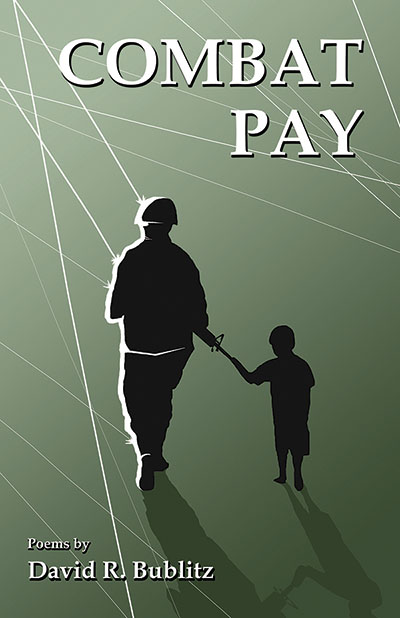Combat Pay
poems by
David R. Bublitz
ISBN: 978-1-59948-783-0, 72 pages, $14 (+ shipping)
Release Date: March 24, 2020
$14.00
poems by
ISBN: 978-1-59948-783-0, 72 pages, $14 (+ shipping)
Release Date: March 24, 2020
 David R. Bublitz is the son of a veteran. He completed an MFA at the Oklahoma City University Red Earth program. He is a 2015 Pangaea Prize finalist, a Naugatuck River Review narrative poetry contest finalist, and a founding editor of Oklahoma City University’s graduate literary magazine, the Red Earth Review. He has published poetry in CONSEQUENCE Magazine; O-Dark-Thirty; f(r)iction; Revise the Psalm: Work Celebrating the Writing of Gwendolyn Books; and Proud to Be: Writing by American Warriors.
David R. Bublitz is the son of a veteran. He completed an MFA at the Oklahoma City University Red Earth program. He is a 2015 Pangaea Prize finalist, a Naugatuck River Review narrative poetry contest finalist, and a founding editor of Oklahoma City University’s graduate literary magazine, the Red Earth Review. He has published poetry in CONSEQUENCE Magazine; O-Dark-Thirty; f(r)iction; Revise the Psalm: Work Celebrating the Writing of Gwendolyn Books; and Proud to Be: Writing by American Warriors.
In Combat Pay, David Bublitz, son of a career-military father, reveals the trauma of the home front, powerfully representing recurrent loss and the anguish of “hurry up and wait.” With love and honesty, often borrowing from military language, he chronicles how military service invades intimate family spaces where a son is simultaneously “half and arm’s/length” and “1,000 yards” away from his sleeping father. Combat Pay is a bomb to the heart. ~Jeanetta Calhoun Mish, Oklahoma State Poet Laureate, Author of What I Learned at the War
David R. Bublitz’s debut collection, Combat Pay, is a poignant and timely examination of an American family grappling with military life interrupted by war. It interrogates the wars we willingly ignore and the human sacrifices we take for granted. In this searing narrative war comes home in a haunting kaleidoscopic peek into the precarious trauma military families live with alongside snatches of memories and moments lived with soldiers who sometimes don’t make it back home. Bublitz’s poetry memoir goes beyond the headlines. His marksman’s eye takes aim at the heart of the matter, jettisoning us on a profound journey into that which connects us to our humanity. Conflating personal history with political reality, cold reportage with the painful actualities of a world haunted by war, Bublitz’s Combat Pay is about “waiting families rationing hope.” It elevates the parallel lives of those shipped off to foreign sand and soil amid endless war while wives and sons and daughters wait anxiously in the not knowing if a loved one would ever come back home. Combat Pay undeniably and exquisitely captures the sacrifices of soldiers and sons, of wives and lives often upended; it calculates with accuracy and compassion the cost of love and war. ~Tony Medina, author of I Am Alfonso Jones and Thirteen Ways of Looking at a Black Boy
The life of the child of a career soldier is one of pained distance, measured study and buckshot attempts at understanding. David Bublitz has lived and done the work. Bublitz details the pathology of regimented order in maddening chaos in deftly varied textures: solemn grace, stern dignity in service, and profound want and confusion. The blur of “Fieldstrip,” it’s relentless neurosis, it’s precise precision, it’s mechanization of life, is so consuming I was gasping for air by the end of the poem, drowning while learning to swim. …the way what you love becomes/what you hate most about yourself, /the reason why you think twice, /the reason why you fight back/ and the reason why you don’t… These poems are open wounds. ~Quraysh Ali Lansana, author of The Breakbeat Poets: New American Poetry in the Age of Hip Hop & the skin of dreams: new & collected poems, 1995-2018
Vietnam Veterans of America, Books in Review II: https://vvabooks.wordpress.com
I never knew my father
before the uniform
flag-starched olive drab
they called camouflage
because every time he put it on
he disappeared
he was gone the day
I was born already invisible
in the field at Basic or AIT
eating dirt and shitting water
while my mother held me
blood sweat and shaking
bundled against her body
like a canvas duffle bag
straps drawn tight
to keep it all from
spilling out
when my father says I love you
he’s fieldstripping an M16
the hand that holds mine
while we cross the street
is thumbing the magazine release
pressing the bolt catch
pulling the charging handle
locking the bolt to the rear
checking the chamber to ensure
the weapon isn’t loaded
when he asks me about my day
he’s striking the bolt release so he can
move the bolt forward for disassembly
the pins in his eyes pivot and takedown
just above the safety selector switch
press the pins charge the weapon
receivers separate upper and lower
as I explain why in the grand scheme of things
nothing at school really seems to matter
he flips the upper receiver around
on the table and pulls the slip ring
until guards fall away careful
to balance the charging handle
retrieve the bolt carrier group
remove the charging assembly
he says a man will do what he has to do
using the charging handle to push
the buffer detent pin and release
the buffer and action spring
it isn’t until the bolt carrier group
is stripped
the firing pin
the bolt cam pin
the bolt
the bolt carrier
the firing pin retaining pin
the extractor
it isn’t until the bolt carrier group
is stripped until he finally says
reattach the top and bottom hand guards
reconnect buffer and action spring
reposition action spring in lower receiver
reassemble bolt carrier group
replace bolt carrier group
reinstall charging handle
realign receivers
clear your weapon
for your own protection
send the bolt forward
without looking back
pull the trigger
After Leo Buscaglia, “The Fall of Freddie the Leaf”
he closed his eyes
some people call it to die
surrounded by hundreds
they sat so quietly
and hardly ever moved
near the top of a tall tree.
at dawn the wind came
transformed in a blaze of color
tore holes in the bark of the tree
deep yellow, bright orange, blazing red
what’s happening? they
asked each other in whispers
torn from their branches–
they fell, others simply let go
tossed about and dropped
lashed back at the wind
carved their names into it
almost as if they were angry
will we all die? freddie asked daniel
who was freddie’s best friend
yes, daniel answered.
we first do our job.
then we die.
don’t scream
ringing in my ears at the top of the stairs
my sister convulses behind me
don’t run
support beams shatter splintered
wood and nails through my feet
cover your face
through the debris I see my mother’s
fingernails in the stairwell carpet
cover your eyes
her torn bra strap loose
limb from her neck
obey all instructions
get in the car get in the car
put your fucking shoes on and get in the car

